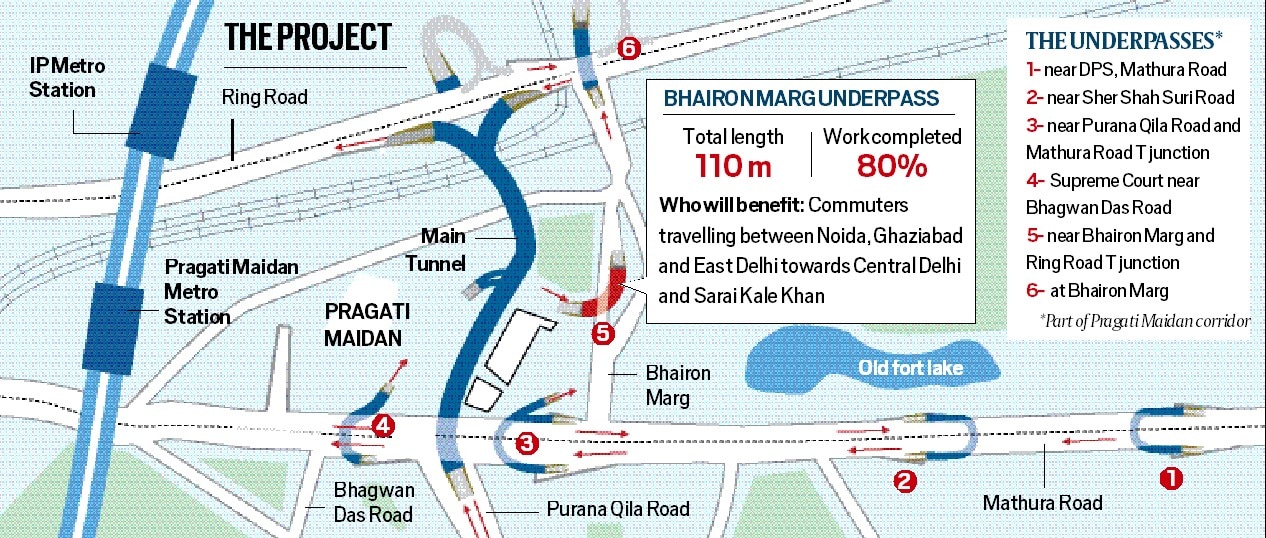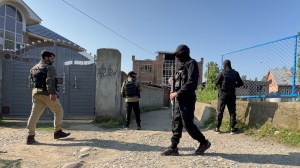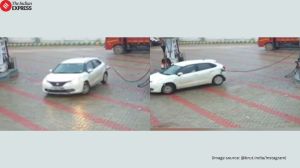Last underpass on Delhi’s Pragati Maidan stretch likely to be wrapped up by February-end
This will benefit commuters travelling between Noida, Ghaziabad and East Delhi towards Central Delhi and Sarai Kale Khan, who can expect a smooth and signal-free commute.
 The total length of the underpass is 110 metres. Work on a 73-metre-long portion has been completed through box pushing technique, said officials. (File)
The total length of the underpass is 110 metres. Work on a 73-metre-long portion has been completed through box pushing technique, said officials. (File) The Bhairon Marg underpass, part of the Pragati Maidan integrated corridor, is expected to be completed by the end of February next year, said officials, adding that 80% of work is complete.
This will benefit commuters travelling between Noida, Ghaziabad and East Delhi towards Central Delhi and Sarai Kale Khan, who can expect a smooth and signal-free commute. Currently, commuters use the Ring Road and then take a U-turn towards Sarai Kale Khan, which causes massive traffic jams on Ring Road and Bhairon Marg and other connected roads.
 According to an official overseeing the project: “The speed of pushing during the initial days was 10-15 mm per day. Now, it has increased to 450-500 mm per day.”
According to an official overseeing the project: “The speed of pushing during the initial days was 10-15 mm per day. Now, it has increased to 450-500 mm per day.”
The Integrated Redevelopment of Pragati Maidan comprises six underpasses and one tunnel. While five underpasses and the 1.36-km tunnel were inaugurated by Prime Minister Narendra Modi in June and are now operational, the last underpass – between Bhairon Marg and Ring Road T junction – was held up.
Officials said construction was delayed due to technical issues as the underpass passes beneath a busy railway track. Besides, the location is also very close to the Yamuna river and faces waterlogging issues during the monsoon.
Officials said Lieutenant Governor VK Saxena recently held a high-level meeting with the Public Works Department (PWD), the executing agency, and Northern Railways and directed the departments concerned to expedite the work and complete it by February. Official sources said the LG also visited the construction site.
The total length of the underpass is 110 metres. Work on a 73-metre-long portion has been completed through box pushing technique, said officials.
“80 per cent of the work is now completed but work on the remaining portion had been pending since May due to lack of coordination between the PWD and Railways,” said sources.
After the meeting on December 20, the matter was also taken up with Union Railway Minister Ashwini Vaishnaw. Following this, the railways gave two blocks of six and four hours each, instead of the earlier single four-hour block, for pushing earth below the tracks.
According to an official overseeing the project: “The speed of pushing during the initial days was 10-15 mm per day. Now, it has increased to 450-500 mm per day.”
Tunneling work at this site involves three-lane box pushing, where designated boxes of earth under the surface are pushed out using manpower and heavy equipment like mobile cranes and rotors while simultaneously ensuring that the sides and roof of the portions tunneled do not cave in by using RCC strengthening measures, said officials.
“Tunneling below the railway tracks, which is a tricky exercise anyway, has become even trickier at this location as the tracks on the surface over here are curved and not straight. Besides, it is very close to Yamuna which is also an issue,” said officials.












